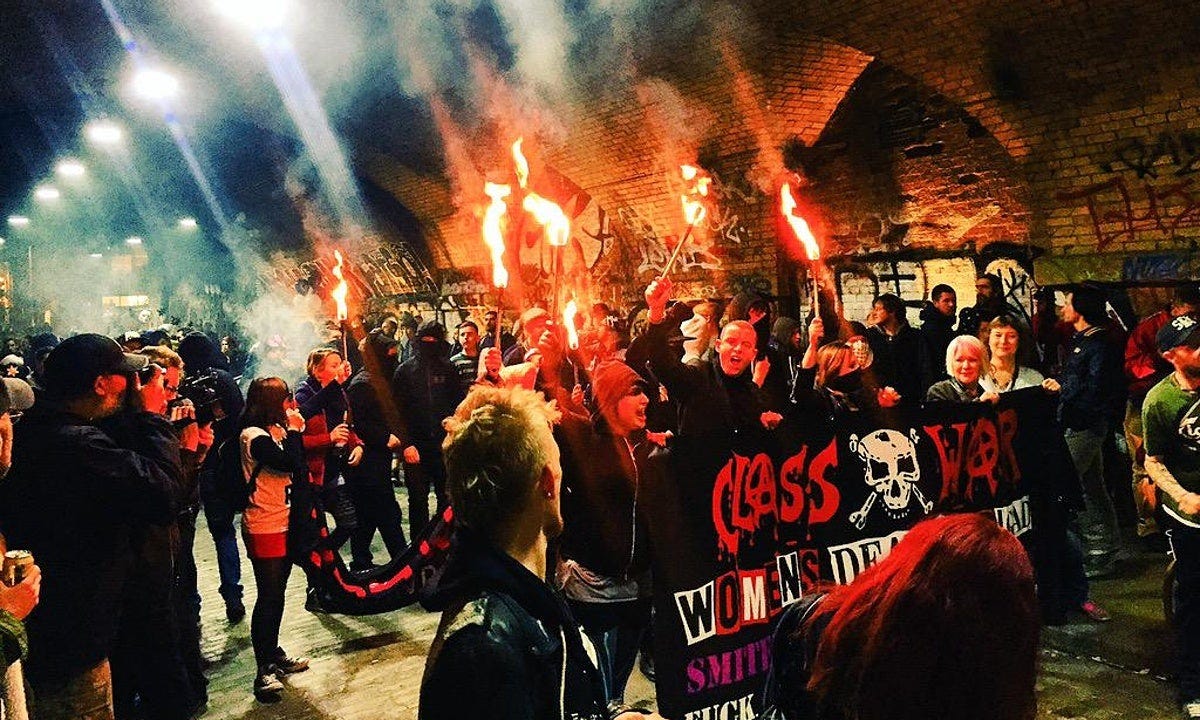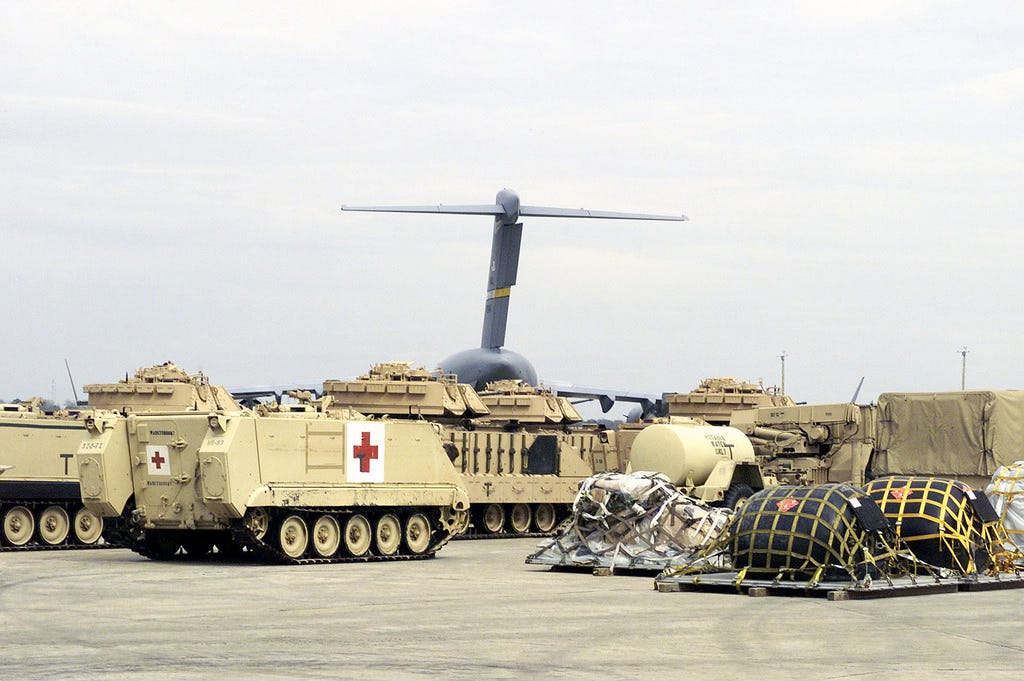Bobby
The Helots take losses with arrests and disappearances, but something has changed. For every man they lose, two take their place. And it’s not just semi-employed young men on the fringes of the economy or civil society. Young women, though not as numerous, show up and carry out missions and acts of resistance. Even older War on Terror veterans turn up to provide training, alibis and safe houses.
And this year feels like their time. On New Years Day, Bobby and a pair of friends talk about how this year might mark the high water mark of the class war. While none of them know how decisive it will be, 2028 shapes up to being decisive quite quickly. The Helots provide protection to the massive protests that rock Detroit for the first half of the year. Strikes grind the auto industry to a halt, going on their own strike, independent of the nation-wide stand-up strikes.
The optics of what was supposed to be a resurgent manufacturing sector paralyzed by strikes is too much for the regime to tolerate. ICE shows up in force that summer and attacks a picket line with live rounds. The deaths pile up as protestors scatter. The Helots have plenty of guns, this is America, after all, and that night they vote to break the rule they’d kept for years. Dozens of ICE agents are shot and many killed over the following weeks. The governor activates the National Guard and tries to lock down Detroit.
But as we’ve seen, many guardsmen and women did not sign up to murder their fellow citizens. They drag their feet, call out sick, and generally don’t follow instructions from federal agents. The Michigan Guard’s tendency to tell the federals that they’d carried out a task when they most certainly had not becomes an internet meme. This is the 21st century, after all. The phrase “A Mitten Minute” becomes not-so-subtle code for “it’s gonna take a REAL LONG TIME for that to happen.”
In August, one of the female Helots gets ahold of a key card for the CBP facility located on 3rd Avenue. She also reveals that the facility does not hold prisoners, so collateral casualties should be kept to a minimum. It presents the Helots with a deadly opportunity. One of the Helots steals a truck from a repo lot; another steals a 40 gallon barrel of liquid chlorine from his job. The Helots plan to drive the truck into the delivery bay, unload the chlorine barrel, break open the lid, then run. The delivery men will pray their industrial respirators will work long enough, about 90 seconds, for them to get out of the building before the chlorine gas concentrations reach fatal levels. Bobby agrees to drive the truck, and hand-writes a letter to his mother, apologizing for the act of terrorism they’re about to commit. He leaves the letter with an elderly protestor at Siani-Grace.
The next morning, Bobby spends a little extra of his couch change on a nice coffee at the corner shop. He spends extra time attempting to flirt with the overworked barista. Failing to make any kind of connection, he walks out to the truck. The truck engine fails to start at first, and a quick wave of relief floods him. But his co-conspirator figures out the problem; they needed to replace the key’s battery. The pair drive in silence along Michigan Avenue, the skyscrapers of downtown sparkle in the mid-morning sun.
Neither of them brought any electronics, so his fellow Helot suggests they turn on the radio. The morning sports talk show is interrupted with breaking news from Lansing. Protestors have overrun the state capitol building and the governor is reading a letter of resignation. He then appoints a pro-Solidarity union leader as acting governor. As they turn off Michigan Avenue onto 3rd, the legislators and crowds cheer as the freshly-minted governor vows to shut down ICE facilities and expel the federal agency from the state.
As if the new governor is speaking directly to them, he specifically asks ‘groups seeking radical action’ to support state and local agencies in confining and ridding the Wolverine State of the harmful federal presence. Bobby and the other Helot exchange glances, turn the truck around, and drive quietly back to west Detroit. Over the following weeks, they will drive the wounded to hospitals, transport materiel in support of the national guard, and provide security in the November election. No one at the job site the chlorine disappeared from ever asks too many questions about why the barrel went missing for over a week.
Allison
The chicken fry place becomes a hot spot for local organizations, focused primarily on mutual aid. As the year goes on, the clientele changes as well, with formerly middle-class patrons showing up to lend time, money, and amusingly self-assured advice about what the poors need to do to negotiate these trying times. Allison begins working regularly with a young woman named Chantel, a 3-L law student at the University of Memphis, on a legal-defense fund for arrested protestors. Fortunately for those being hauled away by the cops and paramilitaries, young legal students work tirelessly to get them out of jail.
These efforts frustrate the local ICE commander, but the mayor of Memphis refuses to shut down the Firestone neighborhood chicken fry. Protests and stand-up strikes escalate until the governor announces the suspension of ‘28 election, citing threats to sitting federal senators and US house representatives. To rub salt in this wound, the state legislature votes to prioritize electricity to data centers over residential users. The state explodes with protest.
Tear gas fills the streets as residents of larger cities like Memphis, Knoxville and Chattanooga drive out debt collectors and shut down transmission lines to data centers. While her mother Rose and grandmother Jenny desperately scramble to keep up with rent, Allison throws herself further into the task at hand; working with utility crews and micro-farmers to keep the Firestone neighborhood’s lights on and food moving around the community.
In late September, far-right paramilitaries and ICE agents seize control of state government operations. Rumors, accurate, as it turns out, that ICE is building up supplies and bringing in extra agents to the FedEx facility, sparks a broad uprising. Protestors blockade the roads to and from the airport. Jillian is there, delivering food to protestors, the night a a dozen armored personnel carriers approach the barricades. Crouched behind a jacked-up pickup, she watches as a representative of the protestors approaches the lead APC. They exchange brief words at a distance, then the camo-clad soldier disappears into the belly of the vehicle.
Jillian hears numerous safeties click off on small arms throughout the Memphis crowds. The hatch of the APC pops open, and the soldiers climb out. One of them carries a broomstick with the Tennessee flag tied to it. They shout that they’ve come to help the people of the city. The crowd, including Allison, erupt with cheers. They turn their attention to the chain-link fence around the airport, and ICE facility beyond. The protestors-turned-armed-mob-turned-citizen-militia follow the guardsmen in the APCs, and after a 90 minute gun battle, overrun the FedEx hub.
What they find inside shocks even the most cynical souls. Allison and Chantel spend days interviewing victims and documenting the killing cages and comfort couches. The images and accounts they circulate to the rest of the nation via third-party websites in Europe break through in a way that even graphic images of bloodied elderly protestors and tear-gassed strikers did’t. Tennessee counties hold November elections over the objections of a state ‘government’ whose power barely extends beyond the city limits of Nashville. The state, along with Allison and her family, votes to secede if the federal government does not honor the results. Anyone with a screen and a working internet connection spends early January combing through every feed from the US Capitol. When the regime finally throws a white flag out a window of the still-no-finished White House ballroom, the streets of Memphis fill up again. This time, the people drink, dance, and shoot fireworks. The party lasts for days.


No comments:
Post a Comment